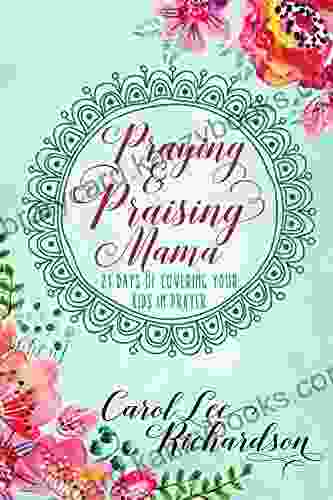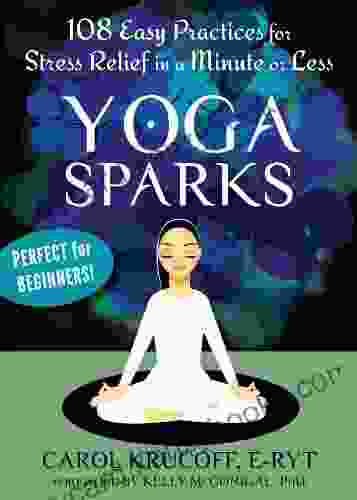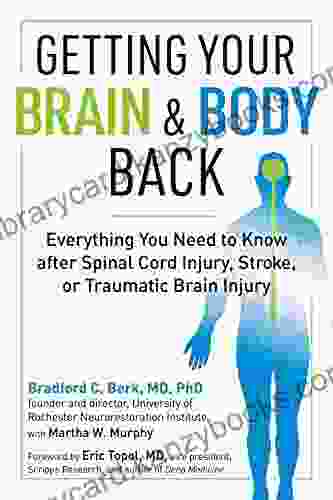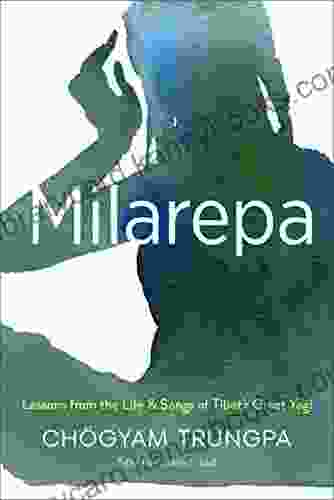Everything You Need To Know After Spinal Cord Injury, Stroke, or Traumatic Brain Injury: A Comprehensive Guide to Recovery and Beyond


Spinal cord injuries, strokes, and traumatic brain injuries (TBIs) are life-altering events that can have a profound impact on your physical, cognitive, and emotional health. The road to recovery can be long and challenging, but with the right support and resources, it is possible to live a full and meaningful life after these injuries.
4.8 out of 5
| Language | : | English |
| File size | : | 11521 KB |
| Text-to-Speech | : | Enabled |
| Screen Reader | : | Supported |
| Enhanced typesetting | : | Enabled |
| Word Wise | : | Enabled |
| Print length | : | 320 pages |
| Lending | : | Enabled |
This comprehensive guide will provide you with everything you need to know about spinal cord injuries, strokes, and TBIs. From understanding the causes and symptoms to navigating the healthcare system and finding support, we will cover all aspects of recovery and beyond.
Chapter 1: Understanding Spinal Cord Injuries, Strokes, and Traumatic Brain Injuries
In this chapter, we will discuss the causes, symptoms, and long-term effects of spinal cord injuries, strokes, and TBIs. We will also provide information on how these injuries are diagnosed and treated, and what you can expect during the recovery process.
Spinal Cord Injuries
A spinal cord injury (SCI) is damage to the spinal cord that results in a loss of function below the level of the injury. SCIs can be caused by a variety of factors, including car accidents, falls, sports injuries, and gunshot wounds.
The severity of an SCI depends on the location and extent of the damage to the spinal cord. SCIs can be classified as either complete or incomplete. A complete SCI means that there is no feeling or movement below the level of the injury. An incomplete SCI means that there is some feeling or movement below the level of the injury.
The symptoms of an SCI can vary depending on the severity of the injury. Common symptoms include:
- Loss of feeling or movement in the arms, legs, or trunk
- Difficulty breathing or swallowing
- Loss of bowel or bladder control
- Sexual dysfunction
- Chronic pain
Strokes
A stroke occurs when the blood supply to the brain is interrupted. This can be caused by a blood clot that blocks an artery in the brain, or by a hemorrhage (bleeding) in the brain.
Strokes can cause a variety of symptoms, depending on the part of the brain that is affected. Common symptoms include:
- Sudden weakness or numbness on one side of the body
- Difficulty speaking or understanding speech
- Vision problems
- Difficulty walking or balancing
- Headache
Traumatic Brain Injuries
A traumatic brain injury (TBI) is damage to the brain that is caused by an external force, such as a blow to the head. TBIs can range in severity from mild to severe. Mild TBIs, also known as concussions, can cause temporary symptoms such as headache, nausea, and dizziness. Severe TBIs can cause more serious symptoms, such as coma, paralysis, and cognitive impairment.
The symptoms of a TBI can vary depending on the severity of the injury. Common symptoms include:
- Headache
- Nausea and vomiting
- Dizziness
- Confusion
- Memory problems
- Difficulty concentrating
- Fatigue
Chapter 2: The Healthcare System and You
After a spinal cord injury, stroke, or TBI, you will likely need to spend some time in the hospital. During this time, you will be evaluated by a team of doctors, nurses, and therapists who will work together to develop a treatment plan for you.
Once you are discharged from the hospital, you will need to continue to see your healthcare providers for regular checkups and follow-up care. These appointments are important for monitoring your progress and making sure that you are getting the best possible care.
The healthcare system can be complex and confusing, but there are resources available to help you navigate it. You can find information on health insurance, financial assistance, and other resources at the following websites:
- The National Spinal Cord Injury Association: https://www.spinalcord.org/
- The National Stroke Association: https://www.stroke.org/
- The Brain Injury Association of America: https://www.biausa.org/
Chapter 3: Finding Support
After a spinal cord injury, stroke, or TBI, it is important to find support from others who understand what you are going through. There are a number of support groups and organizations available to help you connect with other survivors and their families.
Support groups can provide you with a safe and supportive environment to share your experiences, learn from others, and get encouragement. There are support groups for survivors of all ages, abilities, and backgrounds.
In addition to support groups, there are also a number of organizations that can provide you with information, resources, and financial assistance. These organizations can help you find housing, transportation, employment, and other services that you may need.
Chapter 4: Recovery and Beyond
The road to recovery after a spinal cord injury, stroke, or TBI can be long and challenging, but it is possible to live a full and meaningful life after these injuries. With the right support and resources, you can overcome the challenges and achieve your goals.
In this chapter, we will discuss the different aspects of recovery, from physical rehabilitation to cognitive and emotional recovery. We will also provide tips and advice on how to live a full and independent life after a spinal cord injury, stroke, or TBI.
Physical Rehabilitation
Physical rehabilitation is an important part of recovery after a spinal cord injury, stroke, or TBI. Rehabilitation can help you improve your range of motion, strengthen your muscles, and regain your balance and coordination.
There are a variety of different types of physical rehabilitation, including:
- Occupational therapy: Occupational therapy can help you relearn activities of daily living, such as eating, dressing, and bathing.
- Physical therapy: Physical therapy can help you improve your range of motion, strength, and balance.
- Speech therapy: Speech therapy can help you improve your speech, language, and swallowing skills.
Physical rehabilitation can be challenging, but it is an essential part of recovery. With hard work and dedication, you can improve your physical function and regain your independence.
Cognitive and Emotional Recovery
In addition to physical rehabilitation, it is also important to focus on cognitive and emotional recovery after a spinal cord injury, stroke, or TBI. Cognitive recovery can help you improve your memory, attention, and problem-solving skills. Emotional recovery can help you cope with the emotional challenges of living with a disability.
There are a variety of different ways to improve your cognitive and emotional health. Some helpful tips include:
- Set realistic goals and break them down into smaller steps.
- Find activities that you enjoy and challenge yourself intellectually.
- Talk to a therapist or counselor about your feelings.
- Join a support group.
Cognitive and emotional recovery can take time, but it is possible to make progress. With patience and support, you can overcome the challenges and live a full and meaningful life.
Chapter 5: Tips for Living a Full and Independent Life
After a spinal cord injury, stroke, or TBI, it is possible to live a full and independent life. With the right support and resources, you can overcome the challenges and achieve your goals. Here are a few tips to help you get started:
- Set realistic goals for yourself.
- Don't be afraid to ask for help.
- Find activities that you enjoy and challenge yourself.
- Stay positive and don't give up on yourself.
Remember, you are not alone. There are many resources and people who can help you on your journey to recovery. With the right support, you can live a full and meaningful life after a spinal cord injury, stroke, or TBI.
4.8 out of 5
| Language | : | English |
| File size | : | 11521 KB |
| Text-to-Speech | : | Enabled |
| Screen Reader | : | Supported |
| Enhanced typesetting | : | Enabled |
| Word Wise | : | Enabled |
| Print length | : | 320 pages |
| Lending | : | Enabled |
Do you want to contribute by writing guest posts on this blog?
Please contact us and send us a resume of previous articles that you have written.
 Book
Book Novel
Novel Page
Page Chapter
Chapter Text
Text Story
Story Genre
Genre Reader
Reader Library
Library Paperback
Paperback E-book
E-book Magazine
Magazine Newspaper
Newspaper Paragraph
Paragraph Sentence
Sentence Bookmark
Bookmark Shelf
Shelf Glossary
Glossary Bibliography
Bibliography Foreword
Foreword Preface
Preface Synopsis
Synopsis Annotation
Annotation Footnote
Footnote Manuscript
Manuscript Scroll
Scroll Codex
Codex Tome
Tome Bestseller
Bestseller Classics
Classics Library card
Library card Narrative
Narrative Biography
Biography Autobiography
Autobiography Memoir
Memoir Reference
Reference Encyclopedia
Encyclopedia Bruce Humphries Dc
Bruce Humphries Dc Carl Zimmer
Carl Zimmer C Wade Coldiron
C Wade Coldiron Bryan Canter
Bryan Canter Carol Bowman
Carol Bowman Bryan Phillips
Bryan Phillips Brian M Rossiter
Brian M Rossiter Candace Holyfield
Candace Holyfield Carmen Spagnola
Carmen Spagnola Calvin Mccoard
Calvin Mccoard Briana Stockard
Briana Stockard Britt Deanda
Britt Deanda C J Rhoads
C J Rhoads Brian Richey
Brian Richey Brenda Shriver
Brenda Shriver Brian Fies
Brian Fies Brian Scott
Brian Scott Brian Beck
Brian Beck Brian Carter
Brian Carter Camper English
Camper English
Light bulbAdvertise smarter! Our strategic ad space ensures maximum exposure. Reserve your spot today!

 Walter SimmonsThe Chicago Food Encyclopedia Heartland Foodways: A Culinary Guide to the...
Walter SimmonsThe Chicago Food Encyclopedia Heartland Foodways: A Culinary Guide to the... Gary ReedFollow ·4.4k
Gary ReedFollow ·4.4k Gavin MitchellFollow ·14.9k
Gavin MitchellFollow ·14.9k Doug PriceFollow ·17.9k
Doug PriceFollow ·17.9k Ed CooperFollow ·8.1k
Ed CooperFollow ·8.1k Corey GreenFollow ·4.9k
Corey GreenFollow ·4.9k Roland HayesFollow ·17.2k
Roland HayesFollow ·17.2k Lee SimmonsFollow ·11.9k
Lee SimmonsFollow ·11.9k Tennessee WilliamsFollow ·3k
Tennessee WilliamsFollow ·3k

 Anthony Wells
Anthony WellsDiscover the Unbreakable Bond Between a Mother and Her...
Delve into an extraordinary narrative that...

 Brandon Cox
Brandon CoxIt's a New Day Every Ten Minutes: Transform Your Life...
In the tapestry of...

 Christian Barnes
Christian BarnesUnlock Your Serenity: 108 Easy Practices for Stress...
In today's fast-paced,...

 Jerome Powell
Jerome PowellUncover the Thrilling Adventure of "Three for the Bluff"...
: Embark on an Epic Western Saga Prepare...

 Nick Turner
Nick TurnerDive into a Gluten-Free Indulgence with "Simply Gluten...
Unveiling Culinary Delights Are you ready to...
4.8 out of 5
| Language | : | English |
| File size | : | 11521 KB |
| Text-to-Speech | : | Enabled |
| Screen Reader | : | Supported |
| Enhanced typesetting | : | Enabled |
| Word Wise | : | Enabled |
| Print length | : | 320 pages |
| Lending | : | Enabled |











